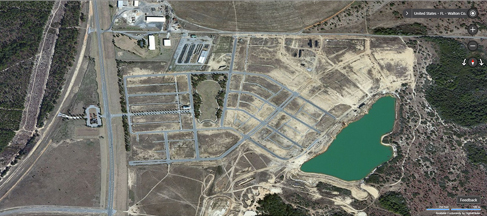© 2017 The Texas Lawbook.
By Mark Curriden
(March 10) – Owl’s Head was planned to be a plush Central Florida inland residential resort about 20 minutes from the Gulf of Mexico with hundreds of upper-income homes and mini-mansions set on 1,600 acres.
Then the Great Recession hit. Only two houses were actually built. Public interest in the project never materialized. The developers defaulted on two loans for a combined $36 million. The banks holding the debts failed.
Two financial institutions – BB&T of North Carolina and Plano-based LNV Corp, a subsidiary of Beal Bank – saw an opportunity for a financial windfall and swooped in to acquire the bad loans. BB&T paid the reduced book value, while LNV bought the distressed debt for nickels on the dollar.
But now, BB&T and LNV – each represented by Dallas lawyers – are mired in fierce, five-year-long breach-of-contract litigation against each other in federal court over $7.4 million.

LNV, a vulture fund that lists North Texas banker Andy Beal as its only director, claims that BB&T improperly settled a lawsuit with the original developers of Owl’s Head for far too little money.
Lawyers for BB&T argue that the settlement was legally justified and that LNV not only did not lose money – it actually profited from the settlement.
So far, BB&T and its legal counsel at Kane Russell Coleman & Logan in Dallas are winning, but the fight is only halfway through round two.
A federal judge in Florida ruled that while BB&T technically breached its contract agreement with LNV, the North Texas fund suffered no financial losses or damages because of the breach. LNV has appealed to the U.S. Court of Appeals for the 11th Circuit in Atlanta.
“The appeal represents LNV’s latest attempt to wring even more profit out of a troubled loan,” KRCL partners David Clem and Kenneth Johnston, who represent BB&T, said in court documents. “LNV used its profits to fund this lawsuit against BB&T.”

Lawyers for LNV and Beal did not respond to requests for comment.
The dispute dates back to 2005 when Owls Head Development and JLD Freeport Investments borrowed $36 million to design and develop the residential community due west of Destin, FL.
Alabama-based Colonial Bank loaned $26 million in 2005 to the two companies, but then sold 23 percent of the loan to Magnet Bank, which was headquartered in Utah. Colonial loaned another $10 million to one of the developers. But the project hit tough times and the developers defaulted on the loans.

Colonial was simultaneously engulfed in a financial fraud scandal. Magnet also failed. The FDIC took over both banks and sold Colonial’s 77 percent to BB&T and Magnet’s interest to LNV. BB&T bought most of Colonial’s assets, including the bank’s share of the Owl’s Head $26 million note, for $18 million.
LNV paid $197,000 to purchase the 23 percent share of the $26 million debt on September 2009.
In 2009, BB&T sued the individuals behind the Owl’s Head project, including development president Douglas Duncan. While LNV did not join the lawsuit, BB&T lawyers notified LNV of all court proceedings and invited LNV officials to attend hearings and mediations, according to legal records.
During the two years of litigation, “LNV never commented on any of these notices, never objected to any litigation strategy and never appeared at mediation,” Clem points out in court documents.
As the litigation proceeded, the value of the property plummeted. The Owl’s Head loan had a book value of $16.2 million in 2009, but had been marked down to $1.47 million by July 2011, according to financial records filed in the litigation.
In August 2011, BB&T – over the objection of LNV – agreed to accept $2.5 million to settle litigation over the original $26 million note. BB&T gave $577,000 of the settlement to LNV – a $280,000 profit.
LNV hired Dallas lawyer James Pennington to sue BB&T for breach of contract.
“Because BB&T breached the agreement by proceeding with the loan modification despite LNV’s refusal to consent, the contractual expectations of LNV and its assignor can be protected and fulfilled only by awarding LNV the repurchase price that BB&T would have had to pay had it complied with the agreement,” Pennington wrote in a brief to the 11th Circuit Court of Appeals.
“BB&T breached the agreement, but it has paid only $577,000,” Pennington stated. “If BB&T had complied with the agreement, the only way it could have modified the loan documents – without LNV’s consent – would have been to pay LNV $7,975,970.”
Pennington pointed out that documents shows that Duncan’s net worth was $48 million and that he had the ability to pay more.
LNV and Beal, who has been a major contributor to tort reform efforts in Texas, also sought punitive damages.
BB&T denied that it had breached its contractual agreement with LNV and claimed that LNV’s damage estimate was based on speculation, conjecture and guesswork. BB&T’s lawyers argued that it was far from certain that the bank would win a lawsuit against Duncan and even more unclear that its collection efforts would be successful.
Chief U.S. District Judge M. Casey Rodgers of Pensacola ruled in June 2016 that BB&T had breached its contract with LNV, but she awarded LNV no damages.
“The court is not persuaded that BB&T’s decision to settle the lawsuit without LNV’s consent damaged LNV at all, because BB&T has not proved that it would have obtained a judgment against Duncan in the underlying lawsuit for the full $34,557,929 owing on the Owls Head loan or that it would have collected that sum from Duncan thereafter,” Judge Rodgers wrote.
“The evidence at trial showed that Duncan’s assets at the time of settlement were mostly illiquid, which would have made collection a difficult and time consuming effort and that he had both the means and intent to actively fight any collection efforts against him,” the judge ruled.
Chief Judge Rodgers also rejected LNV’s request for legal fees.
LNV hired appellate law expert Jeffrey Levinger of Dallas to lead its appeal to the 11th Circuit.
“Once BB&T decided to proceed with the settlement after LNV refused to consent, this triggered a corresponding obligation to pay LNV the purchase price for the benefit of that bargain,” Levinger and Pennington wrote in LNV’s briefs to the federal appeals court. “As a result of the district court’s indefensible zero-damages award, BB&T has now been able to maximize its return to the detriment of both LNV and the FDIC.
“That result cannot stand,” LNV’s petition stated.
BB&T’s lawyers asked the 11th Circuit to rule that the bank had the authority to settle the case without LNV’s consent, but also stated a willingness to accept a decision by the appellate judges to simply uphold the lower court’s opinion.
“After three years of discovery and five days of trial, LNV failed to show that it suffered any damages,” Clem wrote. “It presented zero expert testimony in support of its alleged damages.
“[LNV] offered no analysis or evidence of the value of its participation interest at any specific point in time… the legal maneuvers it might take to achieve a judgment against the obligors or the chances of success in the underlying lawsuits or later in collection efforts,” Clem wrote in BB&T’s briefs.
© 2017 The Texas Lawbook. Content of The Texas Lawbook is controlled and protected by specific licensing agreements with our subscribers and under federal copyright laws. Any distribution of this content without the consent of The Texas Lawbook is prohibited.
If you see any inaccuracy in any article in The Texas Lawbook, please contact us. Our goal is content that is 100% true and accurate. Thank you.
